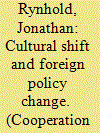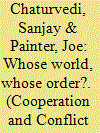| Srl | Item |
| 1 |
ID:
079932


|
|
|
|
|
| Publication |
2007.
|
| Summary/Abstract |
This article analyses the creation of the International Criminal Tribunal for the Former Yugoslavia (ICTY) in light of its potential for creating and institutionalizing justice norms in international society. The theoretical and analytical framework is based on the English School of International Relations and its central conflict between order and justice. The framework integrates a constructivist approach and the `norm life-cycle' to explain the dynamic process of norm emergence and institutionalization in international society. I argue that establishing the ICTY, despite a number of problems resulting from the way it was set up, constituted an important precedent for multilateral action towards institutionalizing respect for the rule of law and principles of individual justice. This suggests that these norms are being taken increasingly seriously and are being given priority over other fundamental principles of order, such as sovereignty and non-intervention. The ICTY's establishment constitutes a significant development in international politics and law and is evidence of the international society's move towards increased norm internationalization. The ICTY also contributed to the establishment of the International Criminal Court and the further institutionalization of human rights norms in creating a more just order
|
|
|
|
|
|
|
|
|
|
|
|
|
|
|
|
| 2 |
ID:
079933


|
|
|
|
|
| Publication |
2007.
|
| Summary/Abstract |
This article analyses the role of cultural shift, as defined by Inglehart, in the major change in Israeli foreign policy embodied in the Oslo Accords. Aside from providing an empirical explanation, it also analyses the Oslo case from a general theoretical perspective concerning the relationship between cultural change and foreign policy change. It argues that a cultural shift towards Postmaterialism led to the rise of a new generation on the Israeli Left with a more Liberal outlook. It was this `Liberal Left' that was primarily responsible for conceiving, initiating and enacting the Oslo Accords. In broader terms, this study provides a new way of examining the relationship between cultural change and foreign policy change. As such, it provides a solid basis for the comparative analysis of the role of a substantive, worldwide cultural trend on foreign policy.
|
|
|
|
|
|
|
|
|
|
|
|
|
|
|
|
| 3 |
ID:
079934


|
|
|
|
|
| Publication |
2007.
|
| Summary/Abstract |
The study of international conflict and cooperation has long drawn on game theory for insights. Recent developments have made the assumptions of game theory more realistic. Particularly important is the development of signaling games, which analyze situations when decision-makers lack complete information about their environment. Signaling game logic has been applied to many areas of international politics in the past decade, including decisions to go to war, crisis bargaining, international economic negotiations, regional integration, and the foreign policies of democratic states. The signaling games approach assumes that states are unitary actors with a single preference ordering and set of beliefs. I relax this assumption by developing an informal model in which decision-makers can hold different prior beliefs and preferences, and investigate this model's usefulness by analyzing how the United States responded to the more cooperative foreign policy signals initiated by the Soviet Union under Gorbachev. This step further deepens the realism of game-theoretic applications to foreign policy by explaining how political conflict among domestic actors influences foreign policy choices
|
|
|
|
|
|
|
|
|
|
|
|
|
|
|
|
| 4 |
ID:
079931


|
|
|
|
|
| Publication |
2007.
|
| Summary/Abstract |
This article offers a critical re-examination of the concept of world order. Taking our cue from Georg Sørensen's recent article in this journal entitled `What Kind of World Order?' we begin by unpacking the concept of order itself. We distinguish two principal meanings of the term: one analytical and descriptive (order as non-randomness) and one value-laden and normative (order as stability and the absence of violent conflict). In debates about world order, these two meanings are often blurred. Drawing on William Connolly's critique of the descriptive-normative distinction, we suggest that this blurring occurs in part because world order is an `essentially contested concept'. Practices of ordering typically involve the production of specific spatializations, yet questions of space and spatiality are largely absent from discussions of world order. In the second part of the article, therefore, we address this absence through a discussion of geo-politics, focusing on US hegemony and neo-liberalism, military geographies and the spaces of marginalization and resistance. The article concludes with some reflections on the political implications of a spatialized account of world order
|
|
|
|
|
|
|
|
|
|
|
|
|
|
|
|